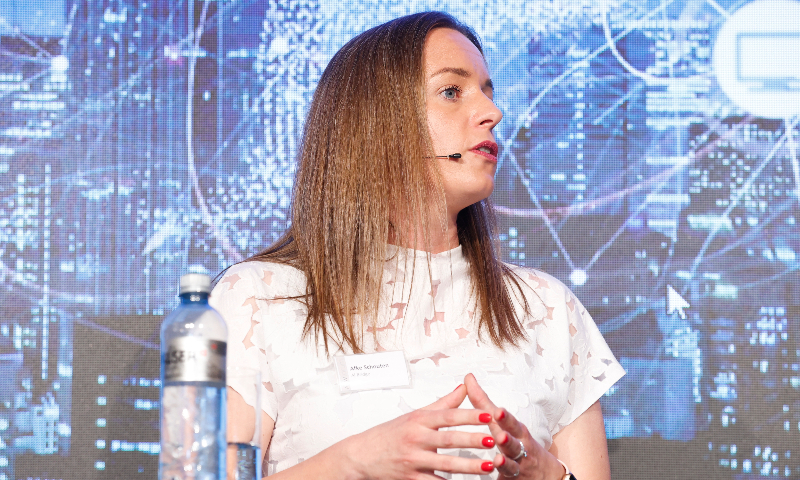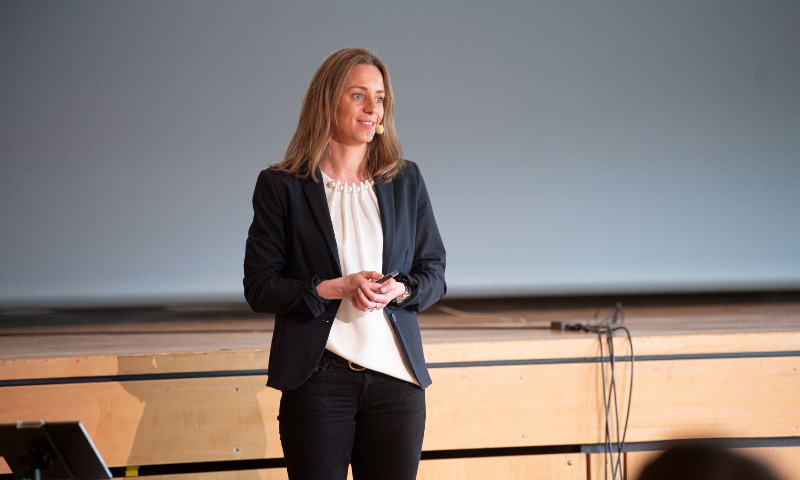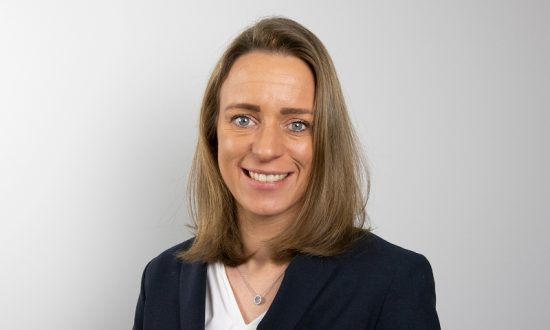As the Founder of AI Bridge in Zurich since 2020, Afke specializes in facilitating organizational AI transformations. She also collaborates on Data & AI Strategy and Academy initiatives at Xebia Data as well as with Datentreiber. Since 2023, she has been a member of the GRDigital FachRat in Switzerland and represents HWZ on the board of Zurich’s Data and AI Leadership Day. At HWZ Hochschule für Wirtschaft, she has been the Head of Major AI in MAS of Digital Business since 2019, where she also directs studies for CAS AI Management & AI Transformation and teaches part-time. Additionally, she is a part-time partner at Future Work Forum, a leading think tank.
Recently, in an exclusive interview with Digital First Magazine, Afke shared her insights on the role of AI in the future, professional trajectory, her top two priorities as the Founder of AI Bridge, her secret to striking a work-life balance, future plans, pearls of wisdom, and much more. The following excerpts are taken from the interview.
How would you define AI? How do you expect AI to develop in the future?
In my view, the academic and business perspectives on artificial intelligence diverge in focus and application. Academically, AI is often conceptualized as the study of algorithms and systems that enable computers to perform tasks that typically require human intelligence. This includes a range of methodologies, from rule-based systems to machine learning and deep learning models.
However, in a business context, my understanding of AI takes a more practical bent. Here, AI serves as a tool for enhancing decision-making processes. Specifically, it is about leveraging AI technologies to make predictive or rule-based judgments about individual entities—be they people or items—within an operational business process. These AI-driven decisions are usually embedded within specialized applications tailored to meet organizational goals.
Therefore, while the academic view may prioritize the intellectual quest to make machines ‘intelligent,’ the business perspective focuses on the application of these intelligent capabilities to achieve tangible business outcomes. I firmly believe that the role of AI in organizations will grow to become even bigger than the size and significance of traditional IT departments. However, there’s a key distinction: AI departments will not operate in isolation. Instead, they’ll be partially integrated into various business functions, requiring a collaborative, multidisciplinary approach. This essential shift requires that organizations undergo an AI Transformation to build these cross-functional teams and fully leverage the capabilities of artificial intelligence.
If you were a CEO of a traditional company that wants to become AI-driven, what would be the first business problem that you would use AI to solve?
Becoming AI Literate: No single AI strategy or use case suits every organization, as each company has unique needs, capabilities, and contexts. The feasibility and impact of any AI use case can vary significantly from one organization to another. Therefore, I strongly recommend that CEOs acquire a fundamental understanding of artificial intelligence. This includes learning about what AI can and cannot do, understanding the breadth of potential applications, and most importantly, understanding what it takes to transition a company into an AI-driven organization. In my experience, the executives who invest the time to become well-versed in AI are the ones who successfully lead their organizations into an AI-driven future.

Afke, please tell us a bit about yourself and how did you start out in the industry.
My journey into data science and AI management began already during university where I studied mathematics and econometrics. My first professional role was as a data scientist allowed me to work on projects focused on customer segmentation and quantifying the value that lies in aggregator data sets.
I later transitioned into management consulting upon relocating to Switzerland, an experience that proved invaluable for me. During this period, I gained deep insights into project management, business goal alignment, and effective stakeholder engagement.
When the first AI wave came to Switzerland in 2013, I got the opportunity to lead a team dedicated to supporting the Sales functions through Analytics and AI. Since then, I’ve consistently worked at the intersection of business strategy and data science. This unique mix of experiences has given me over a decade of expertise gathering in AI Management.
What are your top two priorities as the Founder of AI Bridge?
The mission of our company is to help organizations generate true value with AI. We do this by equipping stakeholders on all different levels in the organization, starting at the top with the board of directors and executive board, all the way to equipping data scientists with the necessary skills and know-how on how to engage with their business stakeholders. A lot of the work we are doing is evangelizing, helping people understand why they need to become AI literate and how to do that. At the same time, we work a lot with organizations that are further along their maturity journey and specifically supporting them in defining and implementing their strategy and use cases.
Why do you think there are still so few females in the technology sector? How can we get more women into technology?
Navigating the issue of gender diversity, and diversity in general, in the technology sector is a complex topic, and frankly, it’s an area that demands attention. The journey towards inclusivity begins in educational institutions, where we must actively encourage and demonstrate the value of STEM subjects to young girls. While steps have been made, progress is slower than I would like to see.
Additionally, industries dominated by men often present fewer opportunities for individuals with family responsibilities, which traditionally impacts women more. This isn’t just a problem within the tech sector; it’s a broader societal issue that requires targeted efforts.
I am optimistic, however, because I do see incremental improvements. Although the pace of change is not going at the speed as I’d like to see, the fact that we are moving in the right direction gives me hope for more equitable opportunities for future generations.
What do you feel has been your ‘career-defining’ moment?
A pivotal moment in my career was the founding of AI Bridge, a venture that for me personally represents both an opportunity as well as a responsibility to steer the industry in the right direction. The initial motivation came from a sense of frustration shared by many of my data scientist peers. These frustrations arose partly from misaligned expectations on their side and partly from a lack of AI literacy among management.
At that same period, I encountered many business stakeholders questioned by the lack of value after hiring data scientists. They had an eagerness to make things work; yet the missing piece was simply the know-how on how to make AI work in an organization.
Realizing this frustration on both sides, I felt that operating as an independent entity would enable me to make a more substantial impact on the industry. My role as a program director at a local business school has allowed me to increase this impact. Through both of these capacities, I’ve been able to influence hundreds if not thousands of professionals, gradually ensuring a more AI-literate market, one step at a time.

What do you think is the best part of being a woman in the tech industry?
It’s challenging for me to provide an outsider’s perspective on gender dynamics in the tech industry, given that I’ve always been a woman working in this field. What I can say is that one of the aspects I most appreciate about working in tech is the opportunity to collaborate with intellectually stimulating individuals.
Days when I can engage in in-depth discussions about statistical methodologies—and then directly link those conversations to real-world business value—are particularly rewarding for me. These are the moments when I feel most energized and fulfilled in my career, as they include both intellectual stimulation and practical application.
Where or whom do you seek motivation and inspiration from? How?
I find inspiration in a diverse group of thought leaders, mostly entrepreneurs and subject-matter evangelists who are at the forefront in their respective fields. What motivates me is their ability to drive meaningful change within their field. To stay connected with their insights and achievements, I actively follow them on LinkedIn. Beyond that, I also engage in face-to-face conversations with these individuals whenever possible. It provides a richer, more nuanced understanding of their perspectives and allows for a deeper level of engagement. These interactions serve as both a source of inspiration and knowledge, this fuels my own drive for both being innovative and being the best in my field.
What is your secret to striking a work-life balance?
I adhere to a “work hard, play hard” philosophy, a balance between professional diligence and personal fun. My approach to the workday is highly organized and focused, enabling me to achieve a very high level of productivity that gives me the time back in the evenings and weekends to mentally disengage from work.
Outside the office, I focus on many different physical activities— You’ll find me regularly in the gym, but also up in the Swiss mountains for hiking or skiing. I even have the honor of playing for the Swiss national korfball team. All the sports does not only keep me physically fit but also serve as a good counterbalance to my work commitments.
In addition, I place a high value on quality time spent with friends. Whether it’s engaging in meaningful conversations or participating in activities that leave us laughing so hard it hurts, these moments provide a different but just as important form of balance. The combination of intense work, sports, and social engagement creates a good work-life balance for me that helps both my professional and personal well-being.
Where do you see yourself in the next 5 years?
Five years from now, I envision myself continuing to specialize in aiding organizations with their AI transformations by helping boards of directors setting a long term vision with AI and supporting the executive board in crafting their strategy for implementation. By that time, AI Bridge will have established itself as a globally recognized brand in the industry. Leveraging deep industry experience, and innovative methodologies of delivery, we’ll have become the go-to resource for businesses looking to integrate artificial intelligence into their operations effectively and responsibly. Our reputation will be built on a foundation of successful case studies, innovative solutions, and a deep understanding of both technological and business considerations in AI implementation, meaning the AI bridge will be built in many more organizations than today.
What advice would you give to a woman considering a career in the tech industry? What do you wish you had known?
Recognizing that men and women often have different approaches and skill sets is crucial for maximizing the effectiveness of a diverse team. I advocate for having more than one woman on a team, and therefore also encourage women to ask for this proactively, to ensure a more balanced and inclusive environment, which can ultimately lead to greater success for everyone involved.






